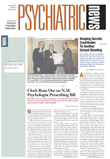When a patient gives his or her psychiatrist a gift as a token of gratitude, is it wise to accept? What should a psychiatrist do if he or she learns that a colleague is behaving inappropriately with a patient? Can a psychiatrist disclose information about a patient to get the patient’s family and friends involved?
These and other ethical dilemmas are addressed by APA’s Ethics Committee in the recently published Ethics Primer of the American Psychiatric Association.
In February APA sent the primer to its 6,000 resident members free of charge. The American Psychiatric Foundation funded the printing and mailing costs. The book will be available next month at the American Psychiatric Press,Inc., booth at APA’s annual meeting in New Orleans.
“Ethics and ethical behavior is a subject that is seldom taught in our medical schools and residency training programs,” said APA President Daniel B. Borenstein, M.D. “When ethics is taught, it rarely focuses on the special ethical issues that psychiatrists encounter.” Borenstein told Psychiatric News that he believes that the primer will better prepare new psychiatrists to recognize and deal with ethical dilemmas.
The ethics primer contains 11 chapters, each written by a member of the Ethics Committee. The primer addresses a number of complex ethical quagmires in which psychiatrists may find themselves and covers many aspects of psychiatry—forensics, emergency care, and consultations, for example (
see box on next page).
To reinforce the real-life quality of the ethical dilemmas, Ethics Committee members used clinical vignettes based on actual cases. To ensure confidentiality, however, no patient names were used in the descriptions.
Plans to teach APA residents and members ethical problem-solving skills began a number of years ago.
Back in 1973, APA developed its first written guidelines on ethics in psychiatry. Titled the Principles of Medical Ethics With Annotations Especially Applicable to Psychiatry, the manual has been updated regularly, most recently this year. It is based on the AMA’s Code of Medical Ethics, which all APA members must follow as a requirement of membership in APA.
In 1989, when Mary Marshall Overstreet, M.D., joined the Committee of Residents and Fellows, she realized that residents were inadequately prepared to identify and deal with potential ethics problems. Around this time, she said, the Ethics Committee became aware of the need to train residents in ethics and began an informal survey of residency training programs in psychiatry to determine the extent to which ethics was being taught.
Finding that ethics training in residency programs was lacking, APA subsequently appointed a special task force to write a model curriculum for teaching ethics in residency programs.
In 1994 then APA President John S. McIntyre, M.D., appointed the Task Force to Develop Model Curricular Material on Medical/Psychiatric Ethics. Overstreet chaired the task force, which reported to the Council on Medical Education and Career Development. In 1996 the task force came up with a model curriculum that it offered to residency training programs. Implementation was voluntary.
Overstreet said, “Since the curriculum was not implemented on a widespread basis, the task force could not ensure that residents would be properly trained on how to handle ethical dilemmas.”
Donald G. Langsley, M.D., is editor of the Ethics Primer of the American Psychiatric Association. Said Langsley, a past APA president and current member of APA’s Ethics Committee, “The primer is a starting place, but ultimately, ethical decisions must be made on a case-by-case basis.” Langsley added that if a psychiatrist needs help with an ethics problem after consulting the primer or APA’s guidelines the psychiatrist should consult the ethics committee of his or her district branch or the teaching faculty of a residency training program.
This is not Langsley’s first endeavor to teach residents about ethics. In 1995 he initiated ethics training courses within the Illinois Psychiatric Society. Every two years, members of the Ethics Committee from that district branch present a daylong course in ethics training to psychiatry residents in the eight residency programs in Chicago.
“Response to the courses has been very positive and attendance good,” said Langsley, who was one of the teachers.
The Ethics Committee will sponsor a symposium on ethics training at APA’s 2001 annual meeting. The symposium, titled “Teaching Ethics to Psychiatry Residents,” will be held Tuesday, May 8, from 2 p.m. to 5 p.m.
APA members may purchase the Ethics Primer of the American Psychiatric Association for $24 plus shipping from American Psychiatric Publishing Inc. by calling (800) 368-5777. The order number is ISBN 0-89042-317-2, and the item number is 2317. The book also may be ordered online at www.healthsourcebooks.org by searching on “Ethics Primer.” ▪
